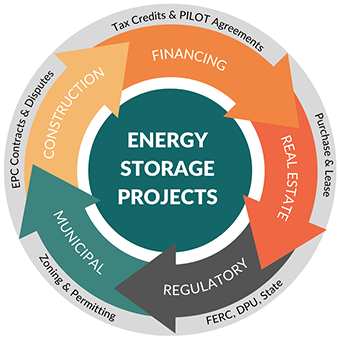From the Northeast and mid-Atlantic to the Southwest and beyond, Pierce Atwood enjoys a national reputation advising clients across the United States on the rapidly growing area of energy storage, representing developers in all phases of their storage project — starting with project financing and continuing through purchasing or leasing land, zoning and permitting, clearing regulatory challenges, and construction.

Guiding the Regulatory Process for Energy Storage
Pierce Atwood energy attorneys have extensive experience representing energy storage clients before the Federal Energy Regulatory Commission (FERC), Independent System Operators/Regional Transmission Operators (ISO/RTO), and public service commissions on issues including, capacity accreditation, storage-as-transmission assets, hybrid resources, and more.
Energy clients rely on Pierce Atwood to provide a deep understanding of the regulatory process and how regulators are likely to rule on various issues. As outside counsel to the U.S. Energy Storage Association from 2006-2021, (prior to its merger into the American Clean Power Association), we recognized early on that FERC and the ISOs needed to change their rules so that energy storage facilities could connect to the grid.
Since rules incorporating energy storage didn’t exist, we wrote them. We then met with FERC leadership and successfully argued that the rules needed to be changed — and they were. Since then, firm clients and their projects have combined to meet the Massachusetts Energy Storage Initiative, which targets 1000 MWh by 2025.
Leading the Way with FERC
Pierce Atwood energy attorneys have led efforts on behalf of the energy storage industry that resulted in:
- FERC Order 755: pay for performance for frequency regulation
- FERC Order 784: Third-Party Provision of Ancillary Services; Accounting and Financial Reporting for New Electric Storage Technologies
- FERC Order 792: interconnection of small generation interconnection agreements
- FERC Order 841: expansion of the storage industry into the energy, capacity, and ancillary services markets
- FERC Order 2222: distributed energy resources
We actively work with both FERC and grid operators to help develop innovative tariffs to allow new energy storage technologies to operate on the grid and to be paid for the benefits they provide, including for voltage regulation, peak shaving, grid reliability, and environmental value.
Our energy lawyers also know that the energy storage marketplace faces a host of challenges, such as integrating storage technologies into the grid and utility distribution systems, and how to incorporate these technologies to alleviate those challenges. Our extensive regulatory experience working with grid operators and utilities ensures that these and other new technologies will satisfy reliability and other regulatory thresholds.
Pierce Atwood's energy storage team also includes real estate and land use attorneys whose work on behalf of battery storage project developers includes zoning, wetlands permitting, MGL C. 61/61A lien releases, and advice on related municipal law matters. For example, in a significant victory for our client, our land use and regulatory attorneys secured the project’s request for a comprehensive zoning exemption as allowed by Massachusetts’ law — the first time that the Massachusetts Department of Public Utilities has granted a comprehensive zoning exemption for a battery storage facility.
Connecting to the Grid with Advanced Technologies
Pierce Atwood attorneys work closely with energy storage companies seeking to incorporate alternative technologies onto the grid or distribution systems, including synchronous condensers, compressed air, batteries, flywheels, and tidal wave, and more.
These companies seek our services to gain an understanding of the regulatory environment, to help use existing rules and regulations to establish a market for their technology, and to develop successful, innovative legal and strategic initiatives to ensure that their technologies are chosen to include on the grid.
Pierce Atwood attorneys work with utilities and grids directly to formulate and initiate pilot programs to test and incorporate these new energy storage technologies into the grid or a distribution system. We then collaborate on collecting the data needed to demonstrate success - both for the development of future projects and to encourage investors to help finance those projects.
